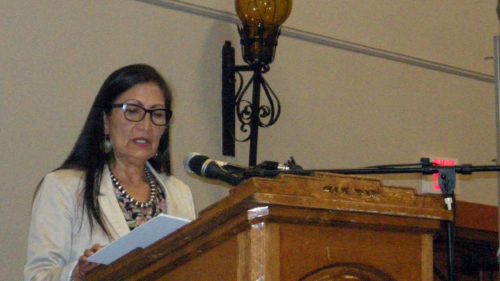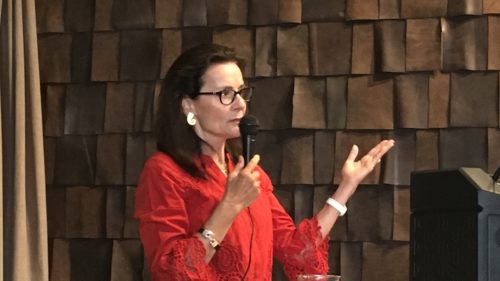The first game commission meeting of 2018 kicked off in Santa Fe and was a short one. This year continues the implementation of new guidelines for public comments during rulemaking so make sure to get involved and stay up to date on all commission related news!
After sailing through agenda items 1 through 11 which tackled the new chairs and vice chair of the state game commission, the adoption of the open meetings resolution, establishing the meeting schedule for the year (find it here!), soliciting nominations for awards, and the approval of the donation of licenses or permits for the Mule Deer Foundation, the commission moved on to opening the rule for Bighorn Sheep.
Agenda Item 12 was presented by Stewart Liley and kicked off a discussion about changing rules for Bighorn Sheep. Under the new rulemaking guidelines the issue will be brought before the commission three times before it’s finalized. Bighorn Sheep and Rocky Mountain Sheep populations are increasing across the state. Proposed amendments to the rule are adjusting the season calendar dates (a regular occurance), modifying the hunt dates to accommodate more hunts, and increase Desert and Rocky numbers for rams. Another proposal is splitting the Dry Cimarron and Rocky Mountain Gorge Hunts as their population trends continues to increase and potentially adding ewe hunts.
The department is looking to address the Rio Grande Gorge herd which continues to expand, there are about 350 animals near the Taos High Bridge that travel all the way to Ute Mountain. This could pose a disease risk due to the presence of domestics in Colorado. The population will be managed at around 300 animals to keep the disease risk down.
The proposal will be heard again at the next meeting where it will still be a discussion item. NMWF Board President John Crenshaw spoke during public comment saying it’s important for the game commission to remember the way statutes define units as it’s his belief that the current rule is in violation of what the statute says. He would like the commission look into the geographically bound area to manage the game species.
Director Alexa Sandoval expressed her “respectful disagreement” with NMWF’s assessment, highlighting the work put in by biologists into the new rule and the care taken into looking into the regulations. She explained, after a question from Chairman Kienzle, that what our position lined out was by giving hunters the ability to pick three different locations to hunt, it does not fit in with the designation of a hunt code. The issue being that no other hunts allow you pick a hunt code, you are given a hunting unit.
After some additional public comment, Commission Ralph Ramos commended the department on how well the sheep are being managed. He noted it’s always changing and management often reflects how things change.
John Crenshaw spoke again adding that he would prefer that the department go back to the unit system that applies to every other animal in the state, but he was still very proud of the department in how this bighorn sheep has grown, it’s just been a joy to watch.
Chairman Kienzle noted that going back to the hunt code described by Crenshaw that it would most likely box out all non residents – Crenshaw agreed with the assessment. Kienzle then noted that the department should be ready for these issues at the next meeting.
Agenda Item 13 opened up the new Javelina rule for initial discussion. Stewart Liley noted that over the counter license haven’t changed harvest rates, which have stayed at about 30 percent success rate throughout the state. The new rule is adjust calendar dates and no other proposed rule changes at this time.
Agenda Item 14 was a presentation of the audit results, at the end of which our Board President again spoke and applauded the department on a clean audit!
Agenda item 15a was a presentation on new rules on rulemaking (which sounds semi-confusing!) Chairman Kienzle was the hearing officer for this item. The new rule is aimed at establishing procedural rules for public rule hearings. The new rulemaking rules (which began last year) includes providing a public comment period of 30 days, outlines new procedures for conducting public hearings, and outlines filing deadlines, and effective dates of newly adopted or repealed rules.
Chairman Kienzle emphasized that he’s read the new rules and that – while nothing is perfect – the new rules provide flexibility on issues that come up and also allows for some flexibility during public comment. He reiterated, as he has in previous meetings, that the best way to have an impact on the commission is to submit written comments as it gives the department and the commission time to reflect on what people are concerned about. Public meetings are very important for transparency but it’s not the best way to get policy done. Submitting public comment on paper allows the professionals who deal with these issues everyday more time to digest the issues.
In response to a question from Commissioner Ryan, the representative from the Attorney General’s office said that the definition of an “interested person” is literally if you’re interested and a person or organization, you’re an interested person.
Kienzle elaborated saying, if you’re an interested person you’ll be treated like everybody else. No one gets special treatment because you think you’ve got more dog in the race than anyone else. You can’t be a lawyer and say you get 30 minutes, it doesn’t work like that.
The new rule was adopted fixing minor corrections.
The final rule amendment on fisheries was also adopted.
Given the new rules put in place, NMWF encourages all hunters and anglers to sign up for NMDGF newsletters to stay up to date on when public comment opens. And to keep a close watch for NMWF emails and alerts.



